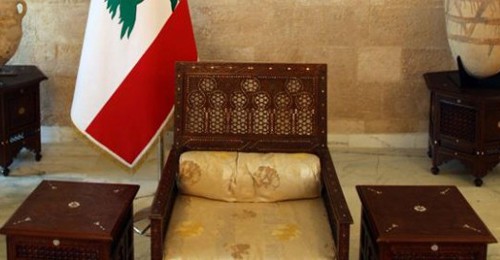Baabda presidential chair awaits the new occupant of the palace after president Michel Aoun’s term expired on October 31 , 2022 .
By Ya Libnan Editorial Board
Lebanese lawmakers are set to meet on Thursday to elect a president, marking a critical juncture for a nation that has been without a head of state for over two years. The absence of a president has left Lebanon mired in a deep political and economic crisis, with divisions between the Iran-backed Shiite group Hezbollah and its opponents paralyzing progress. Despite Hezbollah’s weakened position following recent regional developments, analysts caution that a resolution remains uncertain.
Lebanon’s Presidential Power Vacuum
Under Lebanon’s sectarian power-sharing system, the president must be a Maronite Christian. Since the term of former President Michel Aoun ended in October 2022, the ruling elite has failed to reach a consensus on a successor. Historically, Lebanon’s political class has eventually agreed on a candidate, but this time, entrenched divisions have led to a series of failed parliamentary sessions.
Amidst a list of over a dozen hopefuls, three leading candidates have emerged:
General Joseph Aoun
General Joseph Aoun, 60, has led the U.S.-backed Lebanese army since 2017, steering the military through Lebanon’s financial collapse. During his tenure, he maintained critical U.S. aid flows to the army, which serves as a counterbalance to Hezbollah’s influence.
While Aoun has demonstrated effective leadership in the military, analysts note that his candidacy lacks broad political consensus. Even though Hezbollah claims it has “no veto” on his candidacy, the group’s Christian ally, Gebran Bassil, has openly opposed Aoun, further complicating his path to the presidency.
Major-General Elias Baysari
Elias Baysari, 60, is the interim head of Lebanon’s General Security directorate, overseeing border security and intelligence. A relatively low-profile figure until recently, Baysari’s tenure has been marked by professionalism, but his limited political experience and lack of a proven track record in addressing Lebanon’s economic collapse make him an unlikely choice for unifying and rebuilding the country.
Jihad Azour: A Candidate for Crisis Management
Jihad Azour, 58, stands out as the most qualified candidate to address Lebanon’s multi-faceted crises. A former finance minister (2005–2008) and the current Director of the Middle East and Central Asia Department at the International Monetary Fund (IMF), Azour brings a wealth of experience in financial reform and crisis management.
In 2023, Azour garnered significant support from Lebanon’s main Christian parties, securing 59 parliamentary votes in a previous presidential bid. While Hezbollah labeled him a “confrontational” candidate due to his role in the Siniora government, Azour emphasized his commitment to unity, stating that his candidacy was “a call for common ground to get out of the crisis.”
Lebanon’s Crisis: A Nation on the Brink
Displacement and Refugees
The ongoing conflict with Israel and the collapse of Syria’s Bashar al-Assad regime have compounded Lebanon’s refugee crisis. Over 1.2 million Lebanese—primarily Shiites—have been displaced since September 2024. Meanwhile, Lebanon hosts over 2 million refugees, including 795,000 registered with the UNHCR. The burden of hosting the highest number of refugees per capita has strained the nation’s resources to the breaking point.
Economic Collapse
Lebanon’s economy has been described as one of the worst financial collapses since the 19th century. Key indicators paint a bleak picture:
- Currency crisis: The Lebanese lira has lost over 98% of its value since 2019.
- Debt crisis: Public debt exceeds seven times the country’s GDP.
- Banking crisis: Depositors remain unable to access their funds, with over $72 billion in banking losses.
- Poverty: The poverty rate has soared to 74%, with triple-digit inflation further eroding living standards.
Efforts to secure an IMF rescue package since 2020 have been stymied by political inaction. Lebanon urgently needs a leader capable of implementing reforms to unlock international aid and address its financial woes.
Destruction from War
The recent war between Hezbollah and Israel has left large swathes of Lebanon in ruins. Entire villages in the south have been leveled, while neighborhoods in southern Beirut, including Al Dhahieh, lie in devastation. Rebuilding will require a leader with financial acumen and international credibility.
Why Jihad Azour is the Best Choice
Jihad Azour’s extensive experience in finance and his current role at the IMF uniquely position him to lead Lebanon out of its crisis. As a technocrat with proven expertise, Azour has the skills and global connections needed to:
- Negotiate effectively with international financial institutions.
- Implement structural reforms to stabilize the economy.
- Mobilize resources for rebuilding homes, infrastructure, and public services.
While General Joseph Aoun and Major-General Elias Baysari excel in their current roles, neither has the financial expertise required to address Lebanon’s economic collapse.
A Call to Action
Lebanon stands at a crossroads. The Lebanese Parliament must rise to the occasion and elect a president capable of unifying the nation and spearheading its recovery. Jihad Azour is not just a candidate; he represents hope for a brighter future for Lebanon.
We at Ya Libnan urge lawmakers to put the country’s interests first and choose a leader who can restore stability, rebuild trust, and lead Lebanon into a new era of prosperity.

